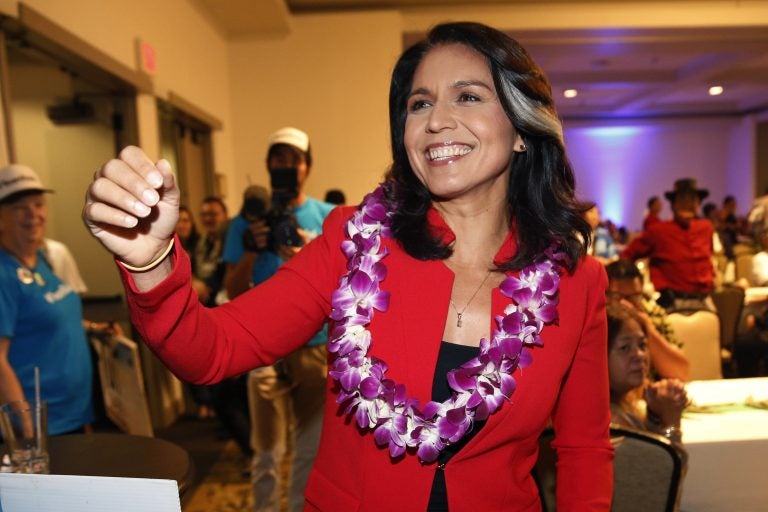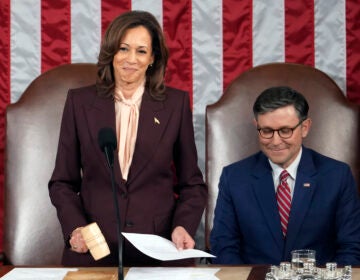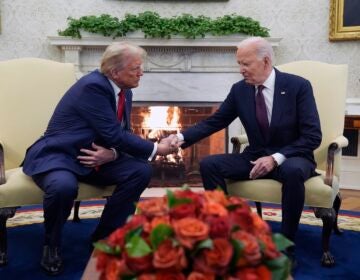Here are the people Trump has picked for key positions so far
Robert F. Kennedy Jr. will lead the Department of Health and Human Services, and Florida Sen. Marco Rubio will be secretary of state.

In this Nov. 6, 2018, file photo, Rep. Tulsi Gabbard, D-Hawaii, greets supporters in Honolulu. The 2020 presidential election already includes more than a half-dozen Democrats whose identities reflect the nation’s growing diversity, as well as embody the coalition that helped Barack Obama first seize the White House in 2008 (Marco Garcia, AP Photo)
President-elect Donald Trump is filling key posts in his second administration, and it’s shaping up much differently than his first. He’s prioritizing loyalists for top jobs.
Trump was bruised and hampered by internal squabbles during his initial term in office. Now he appears focused on remaking the federal government in his own image. Some of his choices could face difficult confirmation battles even with Republicans in control of the U.S. Senate.
Here’s a look at whom he has selected so far.
Cabinet nominees:
Marco Rubio, secretary of state
Trump named Florida Sen. Marco Rubio to be secretary of state, making the critic-turned-ally his choice for top diplomat.
Rubio, 53, is a noted hawk on China, Cuba and Iran, and was a finalist to be Trump’s running mate on the Republican ticket last summer. Rubio is the vice chairman of the Senate Intelligence Committee and a member of the Senate Foreign Relations Committee.
“He will be a strong Advocate for our Nation, a true friend to our Allies, and a fearless Warrior who will never back down to our adversaries,” Trump said of Rubio in a statement.
The announcement punctuates the hard pivot Rubio has made with Trump, whom the senator once called a “con man” during his unsuccessful campaign for the 2016 Republican presidential nomination.
Their relationship improved dramatically while Trump was in the White House. And as Trump campaigned for the presidency a third time, Rubio cheered his proposals. For instance, Rubio, who more than a decade ago helped craft immigration legislation that included a path to citizenship for people in the U.S. illegally, now supports Trump’s plan to use the U.S. military for mass deportations.
Tulsi Gabbard, director of national intelligence
Former Hawaii Rep. Tulsi Gabbard has been tapped by Trump to be director of national intelligence, another example of Trump prizing loyalty over experience.
Gabbard, 43, was a Democratic House member who unsuccessfully sought the party’s 2020 presidential nomination before leaving the party in 2022. She endorsed Trump in August and campaigned often with him this fall, and she’s been accused of echoing Russian propaganda.
“I know Tulsi will bring the fearless spirit that has defined her illustrious career to our Intelligence Community,” Trump said in a statement.
Gabbard, who has served in the Army National Guard for more than two decades, deploying to Iraq and Kuwait, would come to the role as an outsider compared to her predecessor. The current director, Avril Haines, was confirmed by the Senate in 2021 following several years in a number of top national security and intelligence positions.
Pete Hegseth, defense secretary
Hegseth, 44, is a co-host of Fox News Channel’s “Fox & Friends Weekend” and has been a contributor with the network since 2014. He developed a friendship with Trump, who made regular appearances on the show.
Hegseth served in the Army National Guard from 2002 to 2021, deploying to Iraq in 2005 and Afghanistan in 2011. He has two Bronze Stars. However, Hegseth lacks senior military and national security experience. If confirmed by the Senate, he would inherit the top job during a series of global crises — ranging from Russia’s war in Ukraine and the ongoing attacks in the Middle East by Iranian proxies to the push for a cease-fire between Israel, Hamas and Hezbollah and escalating worries about the growing alliance between Russia and North Korea.
Hegseth is also the author of “The War on Warriors: Behind the Betrayal of the Men Who Keep Us Free,” published earlier this year.
Pam Bondi, attorney general
Bondi, 59, has been tapped by Trump to be Attorney General after U.S. Rep. Matt Gaetz withdrew his name from consideration.
She was Florida’s first female attorney general serving between 2011 and 2019. She was on Trump’s legal team during his first impeachment trial in 2020.
Considered a loyalist, she has served as part of a Trump-allied outside group that has helped lay the groundwork for his future administration called the America First Policy Institute.
Bondi was among a group of Republicans who showed up to support Trump at his hush money criminal trial in New York that ended in May with a conviction on 34 felony counts. A fierce defender of Trump, she also frequently appears on Fox News and has been a critic of the criminal cases against him.
Lori Chavez-DeRemer, labor secretary
Oregon Republican U.S. Rep. Chavez-DeRemer narrowly lost her reelection bid earlier this month, but received strong backing from union members in her district.
As a potential labor secretary, Chavez-DeRemer would oversee the Labor Department’s workforce, its budget and put forth priorities that impact workers’ wages, health and safety, ability to unionize, and employer’s rights to fire employers, among other responsibilities.
Chavez-DeRemer is one of few House Republicans to endorse the “Protecting the Right to Organize” or PRO Act would allow more workers to conduct organizing campaigns and would add penalties for companies that violate workers’ rights. The act would also weaken “right-to-work” laws that allow employees in more than half the states to avoid participating in or paying dues to unions that represent workers at their places of employment.
Howard Lutnick, commerce secretary
Lutnick heads up the brokerage and investment bank Cantor Fitzgerald and is a cryptocurrency enthusiast. He is co-chair of Trump’s transition operation, charged along with Linda McMahon, a former wrestling executive who previously led Trump’s Small Business Administration, with helping the president-elect build a Cabinet for his second administration.
As commerce secretary, Lutnick would play a key role in carrying out Trump’s plans to raise and enforce tariffs. He would oversee a sprawling Cabinet department whose oversight ranges from funding new computer chip factories and imposing trade restrictions to releasing economic data and monitoring the weather.
Kristi Noem, secretary of homeland security
Noem is a well-known conservative who used her two terms leading South Dakota to vault to a prominent position in Republican politics.
During the COVID-19 pandemic, Noem did not order restrictions that other states had issued and instead declared her state “open for business.” Trump held a fireworks rally at Mount Rushmore in July 2020 in one of the first large gatherings of the pandemic.
More recently, Noem faced sharp criticism for telling a story in her memoir about shooting and killing her dog.
She is set to lead a department crucial to the president-elect’s hardline immigration agenda as well as other missions. Homeland Security oversees natural disaster response, the U.S. Secret Service and Transportation Security Administration agents who work at airports.
John Ratcliffe, CIA director
Ratcliffe was director of national intelligence during the final year and a half of Trump’s first term, leading the U.S. government’s spy agencies during the coronavirus pandemic.
“I look forward to John being the first person ever to serve in both of our Nation’s highest Intelligence positions,” Trump said in a statement, calling him a “fearless fighter for the Constitutional Rights of all Americans” who would ensure “the Highest Levels of National Security, and PEACE THROUGH STRENGTH.”
Robert F. Kennedy Jr., Health and Human Services secretary
Kennedy ran for president as a Democrat, then as an independent, and then endorsed Trump. He’s the son of Democratic icon Robert Kennedy, who was assassinated during his own presidential campaign.
The nomination of Kennedy to lead the Department of Health and Human Services alarmed people who are concerned about his record of spreading unfounded fears about vaccines. For example, he has long advanced the debunked idea that vaccines cause autism.
Sean Duffy, transportation secretary
Duffy is a former House member from Wisconsin who was one of Trump’s most visible defenders on cable news. Duffy served in the House for nearly nine years, sitting on the Financial Services Committee and chairing the subcommittee on insurance and housing. He left Congress in 2019 for a TV career and has been the host of “The Bottom Line” on Fox Business.
Before entering politics, Duffy was a reality TV star on MTV, where he met his wife, “Fox and Friends Weekend” co-host Rachel Campos-Duffy. They have nine children.
Doug Collins, Veterans Affairs secretary
Collins is a former Republican congressman from Georgia who gained recognition for defending Trump during his first impeachment trial, which centered on U.S. assistance for Ukraine. Trump was impeached for urging Ukraine to investigate Joe Biden in 2019 during the Democratic presidential nomination, but he was acquitted by the Senate.
Collins has also served in the armed forces himself and is currently a chaplain in the United States Air Force Reserve Command.
“We must take care of our brave men and women in uniform, and Doug will be a great advocate for our Active Duty Servicemembers, Veterans, and Military Families to ensure they have the support they need,” Trump said in a statement about nominating Collins to lead the Department of Veterans Affairs.
Doug Burgum, interior secretary
The governor of North Dakota, once little-known outside his state, is a former Republican presidential primary contender who endorsed Trump and then spent months traveling to drum up support for Trump after dropping out of the race.
Burgum was a serious contender to be Trump’s vice presidential choice this summer. The two-term governor was seen as a possible pick because of his executive experience and business savvy. Burgum also has close ties to deep-pocketed energy industry CEOs.
Trump initially announced his choice of Burgum while addressing a gala at his Mar-a-Lago club in Florida on Thursday night. The president-elect’s formal announcement on Friday said he wanted Burgum to be Interior secretary and chairman of a new National Energy Council “that will oversee the path to U.S. ENERGY DOMINANCE.” As chairman of the council, Trump said Burgum will also have a seat on the National Security Council, which would be a first for the Interior secretary.
Chris Wright, energy secretary
A campaign donor and CEO of Denver-based Liberty Energy, Write is a vocal advocate of oil and gas development, including fracking — a key pillar of Trump’s quest to achieve U.S. “energy dominance” in the global market.
Wright also has been one of the industry’s loudest voices against efforts to fight climate change. He said the climate movement around the world is “collapsing under its own weight.” The Energy Department is responsible for advancing energy, environmental and nuclear security of the United States.
Wright also won support from influential conservatives, including oil and gas tycoon Harold Hamm. Hamm, executive chairman of Oklahoma-based Continental Resources, a major shale oil company, is a longtime Trump supporter and adviser who played a key role on energy issues in Trump’s first term.
Linda McMahon, education secretary
McMahon, a billionaire professional wrestling mogul, would be making a return appearance in a second Trump administration. She led the Small Business Administration from 2017 to 2019 during Trump’s initial term and twice ran unsuccessfully as a Republican for the U.S. Senate in Connecticut. She served on the Connecticut Board of Education for a year starting in 2009 and has spent years on the board of trustees for Sacred Heart University in Connecticut. She has expressed support for charter schools and school choice.
Lee Zeldin, Environmental Protection Agency administrator
Zeldin does not appear to have any experience in environmental issues, but is a longtime supporter of the former president. The 44-year-old former U.S. House member from New York wrote on X, “We will restore US energy dominance, revitalize our auto industry to bring back American jobs, and make the US the global leader of AI.”
“We will do so while protecting access to clean air and water,” he added.
During his campaign, Trump often attacked the Biden administration’s promotion of electric vehicles, and incorrectly referred to a tax credit for EV purchases as a government mandate. Trump also often told his audiences during the campaign that his administration would “drill, baby, drill,” referring to his support for expanded petroleum exploration.
In a statement, Trump said Zeldin “will ensure fair and swift deregulatory decisions that will be enacted in a way to unleash the power of American businesses, while at the same time maintaining the highest environmental standards, including the cleanest air and water on the planet.”
Scott Turner, Housing and Urban Development
Turner is a former NFL player and White House aide. He ran the White House Opportunity and Revitalization Council during Trump’s first term in office. Trump, in a statement, credited Turner, the highest-ranking Black person he’s yet selected for his administration, with “helping to lead an Unprecedented Effort that Transformed our Country’s most distressed communities.”
White House staff:
Susie Wiles, chief of staff
Wiles, 67, was a senior adviser to Trump’s 2024 presidential campaign and its de facto manager.
She has a background in Florida politics, helping Ron DeSantis win his first race for Florida governor. Six years later, she was key to Trump’s defeat of him in the 2024 Republican primary.
Wiles’ hire was Trump’s first major decision as president-elect and one that could be a defining test of his incoming administration considering her close relationship with him. Wiles is said to have earned Trump’s trust in part by guiding what was the most disciplined of Trump’s three presidential campaigns.
Wiles was able to help keep Trump on track as few others have, not by criticizing his impulses, but by winning his respect by demonstrating his success after taking her advice.
Mike Waltz, national security adviser
Waltz is a three-term Republican congressman from east-central Florida. A former Army Green Beret, he served multiple tours in Afghanistan and also worked in the Pentagon as a policy adviser when Donald Rumsfeld and Robert Gates were defense chiefs.
He is considered hawkish on China, and called for a U.S. boycott of the 2022 Winter Olympics in Beijing due to its involvement in the origin of COVID-19 and its mistreatment of the minority Muslim Uighur population.
Tom Homan, border czar
Homan, 62, has been tasked with Trump’s top priority of carrying out the largest deportation operation in the nation’s history.
He served under Trump in his first administration leading U.S. Immigration and Customs Enforcement, and he was widely expected to be offered a position related to the border once Trump won the election. Homan said at a July conference in Washington that he would be willing to “run the biggest deportation operation this country’s ever seen.”
Democrats have criticized Homan for defending Trump’s “zero tolerance” policy on border crossings during his first administration, which led to the separation of thousands of parents and children seeking asylum at the border.
Russell Vought, Office of Management and Budget
Vought held the position during Trump’s first presidency.
After Trump’s initial term ended, Vought founded the Center for Renewing America, a think tank that describes its mission as “renew a consensus of America as a nation under God.”
Vought was closely involved with Project 2025, a conservative blueprint for Trump’s second term that he tried to distance himself from during the campaign.
Vought has also previously worked as the executive and budget director for the Republican Study Committee, a caucus for conservative House Republicans. He also worked at Heritage Action, the political group tied to The Heritage Foundation, a conservative think tank.
Stephen Miller, deputy chief of staff for policy
Miller, an immigration hardliner, was a vocal spokesperson during the presidential campaign for Trump’s priority of mass deportations. The 39-year-old was a senior adviser during Trump’s first administration.
Miller has been a central figure in some of Trump’s policy decisions, notably his move to separate thousands of immigrant families. Trump argued throughout the campaign that the nation’s economic, national security and social priorities could be met by deporting people who are in the United States illegally.
Since Trump left office in 2021, Miller has served as the president of America First Legal, an organization made up of former Trump advisers aimed at challenging the Biden administration, media companies, universities and others over issues such as free speech and national security.
Dan Scavino, deputy chief of staff
Scavino was an adviser to all three of the president-elect’s campaigns, and the transition team referred to him as one of “Trump’s longest serving and most trusted aides.” He will be deputy chief of staff and assistant to the president.
He previously ran Trump’s social media profile in the White House during his first administration. He was also held in contempt of Congress in 2022 after a month-long refusal to comply with a subpoena from the House committee’s investigation into the Jan. 6, 2021, attack on the U.S. Capitol.
James Blair, deputy chief of staff
Blair was political director for Trump’s 2024 campaign and for the Republican National Committee. He will be deputy chief of staff for legislative, political and public affairs and assistant to the president.
Blair was key to Trump’s economic messaging during his winning White House comeback campaign this year, a driving force behind the candidate’s “Trump can fix it” slogan and his query to audiences this fall if they were better off than four years ago.
Taylor Budowich, deputy chief of staff
Budowich is a veteran Trump campaign aide who launched and directed Make America Great Again, Inc., a super PAC that supported Trump’s 2024 campaign. He will be deputy chief of staff for communications and personnel and assistant to the president.
Budowich had also served as a spokesman for Trump after his first presidency.
Karoline Leavitt, White House press secretary
Leavitt, 27, was Trump’s campaign press secretary and currently a spokesperson for his transition. She would be the youngest White House press secretary in history.
The White House press secretary typically serves as the public face of the administration and historically has held daily briefings for the press corps.
Leavitt, a New Hampshire native, was a spokesperson for MAGA Inc., a super PAC supporting Trump, before joining his 2024 campaign. In 2022, she ran for Congress in New Hampshire, winning a 10-way Republican primary before losing to Democratic Rep. Chris Pappas.
Leavitt worked in the White House press office during Trump’s first term before she became communications director for New York Republican Rep. Elise Stefanik, Trump’s choice for U.S. ambassador to the United Nations.
William McGinley, White House counsel
McGinley was White House Cabinet secretary during Trump’s first administration, and was outside legal counsel for the Republican National Committee’s election integrity effort during the 2024 campaign.
In a statement, Trump called McGinley “a smart and tenacious lawyer who will help me advance our America First agenda, while fighting for election integrity and against the weaponization of law enforcement.”
Dr. Marty Makary, Food and Drug Administration
Makary is a Johns Hopkins surgeon and author who argued against pandemic lockdowns. During the pandemic he routinely appeared on Fox News and wrote opinion articles questioning mask for children. He cast doubt on vaccine mandates but supported vaccines generally. And he also cast doubt on whether booster shots worked, which was against federal recommendations on the vaccine.
He authored “Blind Spots: When Medicine Gets It Wrong, and What It Means for Our Health.”
Dr. Janette Nesheiwat, surgeon general
Nesheiwat is a general practitioner who serve as medical director for CityMD, a network of urgent care centers in New York and New Jersey. And she’s contributor on Fox News.
Dr. Dave Weldon, director of U.S. Centers for Disease Control
Weldon recently ran for a Florida state legislative seat and lost; Trump backed the other candidate to win.
He also spent many years as a Florida Congressman and weighed in on one of the nation’s most heated debates of the 1990s over quality of life and a right-to-die and whether Terri Schiavo, who was in a persistent vegetative after cardiac arrest, state should have been allowed to have her feeding tube removed. He sided with the parents who did not want it removed.
____
Ambassadors and envoys
Steven Witkoff, special envoy to the Middle East
The 67-year-old Witkoff is the president-elect’s golf partner and was golfing with him at Trump’s club in West Palm Beach, Florida, on Sept. 15, when the former president was the target of a second attempted assassination.
Witkoff “is a Highly Respected Leader in Business and Philanthropy,” Trump said of Witkoff in a statement. “Steve will be an unrelenting Voice for PEACE, and make us all proud.”
Trump also named Witkoff co-chair, with former Georgia Sen. Kelly Loeffler, of his inaugural committee.
Mike Huckabee, ambassador to Israel
Huckabee is a staunch defender of Israel and his intended nomination comes as Trump has promised to align U.S. foreign policy more closely with Israel’s interests as it wages wars against the Iran-backed Hamas and Hezbollah.
“He loves Israel, and likewise the people of Israel love him,” Trump said in a statement. “Mike will work tirelessly to bring about peace in the Middle East.”
Huckabee, who ran unsuccessfully for the Republican nomination in 2008 and 2016, has been a popular figure among evangelical Christian conservatives, many of whom support Israel due to Old Testament writings that Jews are God’s chosen people and that Israel is their rightful homeland.
Trump has been praised by some in this important Republican voting bloc for moving the U.S. embassy in Israel from Tel Aviv to Jerusalem.
Huckabee has rejected a Palestinian homeland in territory occupied by Israel, calling for a so-called “one-state solution.”
Elise Stefanik, ambassador to the United Nations
Stefanik is a representative from New York and one of Trump’s staunchest defenders going back to his first impeachment.
Elected to the House in 2014, Stefanik was selected by her GOP House colleagues as House Republican Conference chair in 2021, when former Wyoming Rep. Liz Cheney was removed from the post after publicly criticizing Trump for falsely claiming he won the 2020 election. Stefanik, 40, has served in that role ever since as the third-ranking member of House leadership.
Stefanik’s questioning of university presidents over antisemitism on their campuses helped lead to two of those presidents resigning, further raising her national profile.
If confirmed, she would represent American interests at the U.N. as Trump vows to end the war waged by Russia against Ukraine that began in 2022.
Matthew Whitaker, ambassador to NATO
A former acting attorney general during Trump’s first administration and tight end on the University of Iowa football team, Whitaker, 55, has a background in law enforcement but not in foreign policy.
A fierce Trump localist, Whitaker, is also a former U.S. attorney in Iowa and served as acting attorney general between November 2018 and February 2019 without Senate confirmation, until William Barr was confirmed for the role. That was when special counsel Robert Mueller’s investigation into Russian election interference was drawing to a close.
Whitaker also faced questions about his past business dealings, including his ties to an invention-promotion company that was accused of misleading consumers.
Pete Hoekstra, ambassador to Canada
A Republican congressman from Michigan who served from 1993 to 2011, Hoekstra was ambassador to the Netherlands during Trump’s first term.
“In my Second Term, Pete will help me once again put AMERICA FIRST,” Trump said in a statement announcing his choice. “He did an outstanding job as United States Ambassador to the Netherlands during our first four years, and I am confident that he will continue to represent our Country well in this new role.”
Dr. Mehmet Oz, Centers for Medicaid and Medicare Services
Oz, 64, is a former heart surgeon who hosted “The Dr. Oz Show,” a long-running daytime television talk show. He ran unsuccessfully for the U.S. Senate as the Republican nominee in 2022 and is an outspoken supporter of Trump, who endorsed Oz’s bid for elected office.
Withdrawn
Matt Gaetz for attorney general
Gaetz, 42, withdrew from consideration to become the top law enforcement officer of the United States amid fallout over a federal sex trafficking investigation that cast doubt on his ability to be confirmed by the Senate.
Trump had announced Gaetz as his choice for attorney general on Nov. 13, passing over more established lawyers whose names had been floated as possible contenders for the job.
Gaetz resigned from Congress after Trump announced him. The House Ethics Committee has been investigating an allegation that he paid for sex with a 17-year-old.
Gaetz has denied any wrongdoing.
___
WHYY is your source for fact-based, in-depth journalism and information. As a nonprofit organization, we rely on financial support from readers like you. Please give today.





